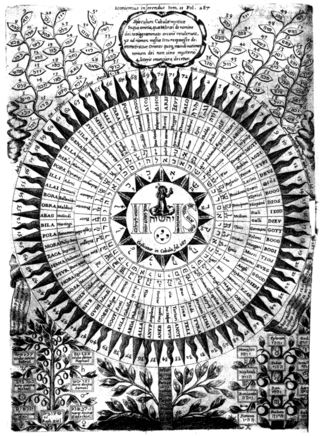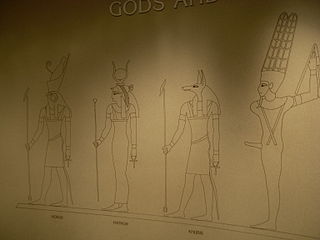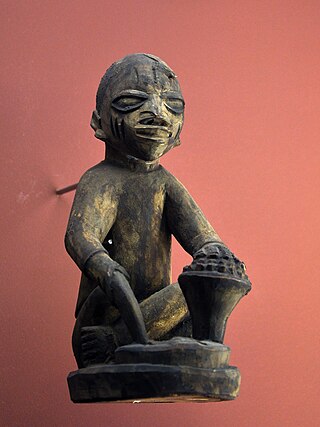Related Research Articles

A demon is a malevolent supernatural entity. Historically, belief in demons, or stories about demons, occurs in folklore, mythology, religion, and literature; these beliefs are reflected in media including comics, fiction, film, television, and video games. Belief in demons probably goes back to the Paleolithic age, stemming from humanity's fear of the unknown, the strange and the horrific. In ancient Near Eastern religions and in the Abrahamic religions, including early Judaism and ancient-medieval Christian demonology, a demon is considered a harmful spiritual entity that may cause demonic possession, calling for an exorcism. Large portions of Jewish demonology, a key influence on Christianity and Islam, originated from a later form of Zoroastrianism, and was transferred to Judaism during the Persian era.
Henotheism is the worship of a single, supreme god that does not deny the existence or possible existence of other deities that may be worshipped. Friedrich Schelling (1775–1854) coined the word, and Friedrich Welcker (1784–1868) used it to depict primitive monotheism among ancient Greeks.
Monotheism is the belief that one god is the only deity. A distinction may be made between exclusive monotheism, in which the one God is a singular existence, and both inclusive and pluriform monotheism, in which multiple gods or godly forms are recognized, but each are postulated as extensions of the same God.

In religion and theology, revelation is the disclosing of some form of truth or knowledge through communication with a deity (god) or other supernatural entity or entities.
A creator deity or creator god is a deity responsible for the creation of the Earth, world, and universe in human religion and mythology. In monotheism, the single God is often also the creator. A number of monolatristic traditions separate a secondary creator from a primary transcendent being, identified as a primary creator.

Supernatural refers to phenomena or entities that are beyond the laws of nature. The term is derived from Medieval Latin supernaturalis, from Latin super- + natura (nature). Although the corollary term "nature" has had multiple meanings since the ancient world, the term "supernatural" emerged in the Middle Ages and did not exist in the ancient world.

Comparative religion is the branch of the study of religions with the systematic comparison of the doctrines and practices, themes and impacts of the world's religions. In general the comparative study of religion yields a deeper understanding of the fundamental philosophical concerns of religion such as ethics, metaphysics and the nature and forms of salvation. It also considers and compares the origins and similarities shared between the various religions of the world. Studying such material facilitates a broadened and more sophisticated understanding of human beliefs and practices regarding the sacred, numinous, spiritual and divine.
Many Wikipedia articles on religious topics are not yet listed on this page. If you cannot find the topic you are interested in on this page, it still may already exist; you can try to find it using the "Search" box. If you find that it exists, you can edit this page to add a link to it.

Idolatry is the worship of a cult image or "idol" as though it were a deity. In Abrahamic religions idolatry connotes the worship of something or someone other than the Abrahamic God as if it were God. In these monotheistic religions, idolatry has been considered as the "worship of false gods" and is forbidden by texts such as the Ten Commandments. Other monotheistic religions may apply similar rules.

There are various names of God, many of which enumerate the various qualities of a Supreme Being. The English word god is used by multiple religions as a noun to refer to different deities, or specifically to the Supreme Being, as denoted in English by the capitalized and uncapitalized terms God and god. Ancient cognate equivalents for the biblical Hebrew Elohim, one of the most common names of God in the Bible, include proto-Semitic El, biblical Aramaic Elah, and Arabic ilah. The personal or proper name for God in many of these languages may either be distinguished from such attributes, or homonymic. For example, in Judaism the tetragrammaton is sometimes related to the ancient Hebrew ehyeh. It is connected to the passage in Exodus 3:14 in which God gives his name as אֶהְיֶה אֲשֶׁר אֶהְיֶה, where the verb, translated most basically as "I am that I am" or "I shall be what I shall be", "I shall be what I am" In the Hebrew Bible, YHWH, the personal name of God, is revealed directly to Moses. Correlation between various theories and interpretation of the name of "the one God", used to signify a monotheistic or ultimate Supreme Being from which all other divine attributes derive, has been a subject of ecumenical discourse between Eastern and Western scholars for over two centuries. In Christian theology the word is considered a personal and a proper name of God. On the other hand, the names of God in a different tradition are sometimes referred to by symbols. The question whether divine names used by different religions are equivalent has been raised and analyzed.
The Phaedrus, written by Plato, is a dialogue between Socrates, and Phaedrus, an interlocutor in several dialogues. The Phaedrus was presumably composed around 370 BC, about the same time as Plato's Republic and Symposium. Although ostensibly about the topic of love, the discussion in the dialogue revolves around the art of rhetoric and how it should be practiced, and dwells on subjects as diverse as metempsychosis and erotic love, and the nature of the human soul shown in the famous Chariot Allegory.
In Plato's Ion Socrates discusses with the titular character, a professional rhapsode who also lectures on Homer, the question of whether the rhapsode, a performer of poetry, gives his performance on account of his skill and knowledge or by virtue of divine possession. It is one of the shortest of Plato's dialogues.
The religions of the ancient Near East were mostly polytheistic, with some examples of monolatry. Some scholars believe that the similarities between these religions indicate that the religions are related, a belief known as patternism.
The gender of God can be viewed as a literal or as an allegorical aspect of a deity.

Inspiration is an unconscious burst of creativity in a literary, musical, or visual art and other artistic endeavours. The concept has origins in both Hellenism and Hebraism. The Greeks believed that inspiration or "enthusiasm" came from the muses, as well as the gods Apollo and Dionysus. Similarly, in the Ancient Norse religions, inspiration derives from the gods, such as Odin. Inspiration is also a divine matter in Hebrew poetics. In the Book of Amos the prophet speaks of being overwhelmed by God's voice and compelled to speak. In Christianity, inspiration is a gift of the Holy Spirit.

The concept of Hellenistic religion as the late form of Ancient Greek religion covers any of the various systems of beliefs and practices of the people who lived under the influence of ancient Greek culture during the Hellenistic period and the Roman Empire. There was much continuity in Hellenistic religion: people continued to worship the Greek gods and to practice the same rites as in Classical Greece.
Cicada lore and mythology is rich and varied as there are c. 2500 species of cicada throughout the world, many of which are undescribed and remain a mystery to science. Cicada has been prized as a delicacy, and are famed throughout the world for their song.

Polytheism is the belief in or worship of more than one god. According to Oxford Reference, it is not easy to count gods, and so not always obvious whether an apparently polytheistic religion, such as Chinese Folk Religions, is really so, or whether the apparent different objects of worship are to be thought of as manifestations of a singular divinity. Polytheistic belief is usually assembled into a pantheon of gods and goddesses, along with their own religious sects and rituals. Polytheism is a type of theism. Within theism, it contrasts with monotheism, the belief in a singular God who is, in most cases, transcendent.

In theology, divine light is an aspect of divine presence perceived as light during a theophany or vision, or represented as such in allegory or metaphor.

A deity or god is a supernatural being considered to be sacred and worthy of worship due to having authority over the universe, nature or human life. The Oxford Dictionary of English defines deity as a god or goddess, or anything revered as divine. C. Scott Littleton defines a deity as "a being with powers greater than those of ordinary humans, but who interacts with humans, positively or negatively, in ways that carry humans to new levels of consciousness, beyond the grounded preoccupations of ordinary life".
References
- ↑ Sullivan, Bruce M. (1997). Historical Dictionary of Hinduism. Scarecrow Press. p. 143. ISBN 9780810833272.
- ↑ Asiatic Researches at Google Books, - History and Antiquities, the Arts, Sciences and Literature of Asia, Volume 3, London, pages 272-273
- ↑ Lambert, Gray (2013). The Leaders Are Coming!. WestBow Press. p. 287. ISBN 9781449760137.
- ↑ Roy H. Williams; Michael R. Drew (2012). Pendulum: How Past Generations Shape Our Present and Predict Our Future. Vanguard Press. p. 143. ISBN 9781593157067.[ permanent dead link ]
- ↑ Shrine of Wisdom, "Plato and the Four Inspirations", in 3 parts, Vol 29 & 30 (1926), Vol 31 (1927)